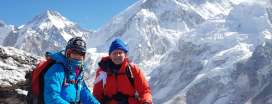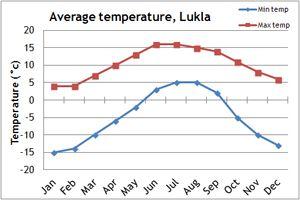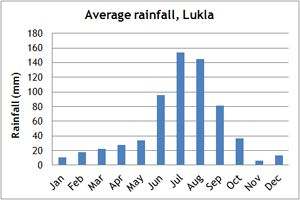Our grading system explained
What makes Everest Region so special?
To go on trek in Everest still tops the wishlist of many keen trekkers, particularly those wanting to trek to Everest Base Camp and stand at the foot of the world’s highest mountain. This iconic trek retains its allure and, during the main spring and autumn seasons, the trails to Everest are busy with trekkers, climbers and adventurers from around the globe.
On trips to Everest Base Camp, most trekkers will stay in traditional tea houses en route to Everest, offering Sherpa hospitality, wholesome food and a comfy bed for the night, but there is now the option to trek to Everest Base Camp in style, staying in more luxurious trekking lodges and high quality tea houses with en suite rooms, running hot water and high standards of service. Whichever accommodation you choose, this trek rightly remains one of the great treks of the world taking you through a variety of beautiful and dramatic mountain scenery, past the atmospheric Thyangboche Monastery and on to the most famous Base Camp in the world.
Aside from the trek to Base Camp, there are several other Mount Everest trips you can consider. The trek to Gokyo Lakes does initially follow the same route to Everest Base Camp but then goes beyond to the beautiful Gokyo Lakes. Trek further still and you cross the Three High Passes of Everest for a real sense of remoteness. If you have less time for your Everest holiday then consider a shorter trek to Ama Dablam Base Camp – staying in luxury lodges and still enjoying stunning scenery and views but not going as far or as high. Several of these treks to Everest and beyond are timed to coincide with the magical Mani Rimdu Festival in the autumn - a spectacular and colourful celebration of Tibetan Buddhism.
For those with a real taste of adventure and a head for heights than tackling a trekking peak such as Mera Peak offers a superb, high altitude challenge.
The sheer scale, majesty and drama of the mountain scenery, together with the wonderful hospitality of the Sherpa people, still makes Everest the premiere destination for trekking in Nepal.
Mount Everest Base Camp Trips & Holidays

Home to the Sherpa people and the world's highest mountain, the Everest region is the premier trekking destination in the world.
0 Holidays
- 1
Introduction
Not just scenically spectacular, with several mountains soaring above 8,000m, the Everest region is the native homeland of the wonderfully welcoming Sherpa people. Mount Everest, at 8,850,/29,035ft, is of course the star attraction and the trek to Everest Base Camp remains one of the great treks of the world. You can now choose whether to stay in traditional tea houses en route by taking the classic Everest Base Camp Trek or stay in top quality lodges on our Everest Base Camp in Style trek.
The beautiful trek to Gokyo Lakes and the High Passes beyond, provide opportunities to extend the trek to Everest Base Camp and to experience quieter trails and even more dramatic landscapes. Whilst the Long Trek to Everest Base Camp is perhaps the ultimate of all the Everest Base Camp trips, and follows in the footsteps of the original Everest pioneers.
Alternatively Luxury Lodges to Ama Dablam Base Camp trek takes you in part along the route to Everest, staying in the best trekking lodges available, but then diverts to reach the foot of one of the most beautiful mountains in the Himalaya.
In the autumn, the Mani Rimdu festival is one of the great cultural events of the region drawing Sherpas and trekkers to the stunningly situated Thyangboche Monastery at the heart of the Khumbu. You can attend the festival on our Everest Base Camp & Gokyo Lakes Trek.
The Khumbu is also the perfect place to try out the additional challenge of reaching the summit of a trekking peak such as Mera Peak.
So, if you're looking for the perfect Everest Base Camp holiday that is challenging, rewarding, safe and achievable, look no further than Mountain Kingdoms - the Himalayan experts.
Related news and articles
Kit list for the Everest Base Camp Trek
Guide to Trekking Everest Part 1 - Preparation
Guide to Trekking Everest Part 2 - On Trek
Key Facts
- Capital: Namche Bazaar is the largest town in the Everest region
- Airport: Lukla
- Population: 108,000 (est.2011 ) Solo Khumbu region
- Size of region: 3,312 km sq
- Currency: Nepalese Rupee
- Power supply: 220-240 v, 50 hz
- Sockets: Mainly 2-pin round but 3-pin round may also be in use
- Language: Nepali,
- Time difference: GMT +5.75 hours
- Visas/permits: A permit is required to enter the Sagamartha National Park (this is included in the cost of your Mountain Kingdom holiday and obtained at the park by your guide).
- Religion: Predominantly Buddhist
- Popular dishes: Daal bhat
- Popular drinks: Tea (chiya)
- Did you know: The Everest region contains three of the world's top ten highest mountains - Lhotse, Cho Oyu and Everest itself.
- FCDO link: FCDO travel advice for Nepal
Climate
When is the best time to travel to the Everest region of Nepal?


Our temperature and rainfall charts will give you a guide to the climate in the Everest region.
It is possible to travel to Nepal throughout much of the year, though for walking and trekking in the Everest region of Nepal, the best time to go is in spring (March-April) and autumn (October-November).
Between March and April, the weather begins to warm up, and a whole range of Everest trekking options are available. Skies may be more cloudy than in autumn, but the beautiful rhododendron and magnolia will be in bloom making spring a premier time for a visit to Everest Base Camp. It is also the time of year to visit if you want to see climbing expeditions at Base Camp preparing for their summit bids.
In summer, from June to August, Nepal experiences the monsoon rains. As well as travel disruption, there are no mountain views, so trekking in the Everest region during the summer is not worthwhile. There are alternative mountain ranges which are at their best during the summer due to lying in the rain shadow, such as Mustang and Dolpo.
Autumn is thought to be the best time to visit the Everest region. With dry weather and crisp, clear skies, the mountain views are at their best. The countryside is green and lush, following the summer monsoon. However, during this period the popular trails can be busy, and flights book up quickly, so do book in advance if you want to trek in Nepal during the autumn. We've introduced many treks which will get you off-the-beaten-path, and away from the crowds during this season.
In winter, the days are generally dry and bright, though at altitude the evenings will be extremely cold, and some high passes can be blocked by snow. Although a high-altitude trek may not be possible, winter can be a great time to visit Nepal, as there are fewer tourists. There are some fantastic walking and trekking holidays which are perfect for an adventurous winter holiday. You can even trek to Everest Base Camp during the Christmas holidays.
If you can't make the dates of one of our Everest Base Camp package trips for small groups, then take a private departure on dates to suit you, or we can create a Tailor Made holiday to the Everest region of Nepal, especially for you and your family or friends.
Frequently asked Questions
- How much does it cost to go to Everest Base Camp?
-
You can see all the prices for our Everest Base Camp trips on the individual holiday pages. As spring and autumn are the peak times of the year to visit, flight prices to Nepal are higher during these seasons. However, if you book early you will get better prices and our Flights Manager, April, will source the best deals to Kathmandu.
- Can a beginner go to Everest Base Camp?
-
At 5,300m, any trip to Everest Base Camp is a serious undertaking and shouldn't be tackled without a good amount of physical preparation. Ideally, you should be a regular hill walker although this doesn't have to be in high mountains - you can prepare in the beautiful mountain landscapes of the UK. You also need to have good walking boots (that are well broken in) and suitable clothing for trekking in the variable conditions you will encounter. If you start your preparation early enough, and follow the advice we provide to anyone trekking to Everest Base Camp with us, then even a novice can make it to the foot of the world's highest mountain.
- Can you do Everest Base Camp without training?
-
We wouldn't recommend trekking to Everest Base Camp without some degree of training. Ideally this will be in a hilly, mountainous environment with consecutive days of walking, supplemented by workouts to build strength in the legs. If you book an Everest Base Camp trip with us we provide a useful dossier of pre-trek information including physical preparation.
- Is reaching Everest Base Camp difficult?
-
It's definitely a physical challenge due mainly to the effects of high altitude and the rocky, dusty terrain that you encounter in sections of the trail. Most people will experience some minor symptoms of altitude sickness but, our carefully designed itineraries will aid acclimatisation and minimise the effects of reduced oxygen levels as you climb the trail. Our highly experienced guides will also help keep your spirits up if you're starting to flag and give you lots of positive energy to make it all the way to Base Camp. It's a great achievement to make it, and well worth the exertions and challenges of the trek.
- What is the best time to visit Everest Base Camp?
-
The spring and autumn months are the peak times of the year to trek to Base Camp due to the warmer temperatures, good visibility and accessibility. The trail isn't accessible though during the heavy monsoon rain of the summer monsoon months. Take a look at our climate information for more detail on the best time to visit to Base Camp.
- Where do you sleep on Everest Base Camp?
-
You won't spend the night at Base Camp itself as there are no facilities there. Instead you will stay in simple tea house accommodation a little further down the trail. This will enable you to trek to Base Camp and the nearby peak of Kala Pattar on consecutive days. You can stay in tea houses for the entire trek or, if you'd prefer a more indulgent level of accommodation on the lower reaches of the trail, we offer an 'In Style' version of the classic trek which uses high quality trekking lodges with real touches of luxury.




